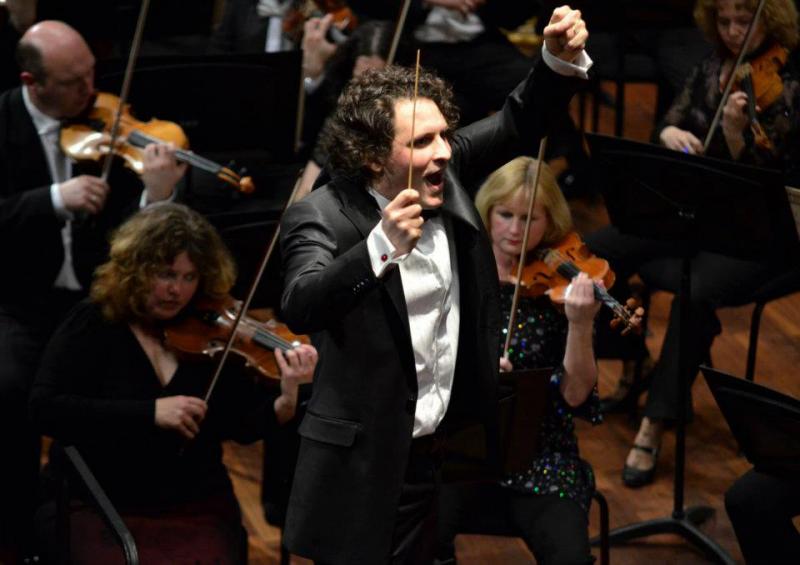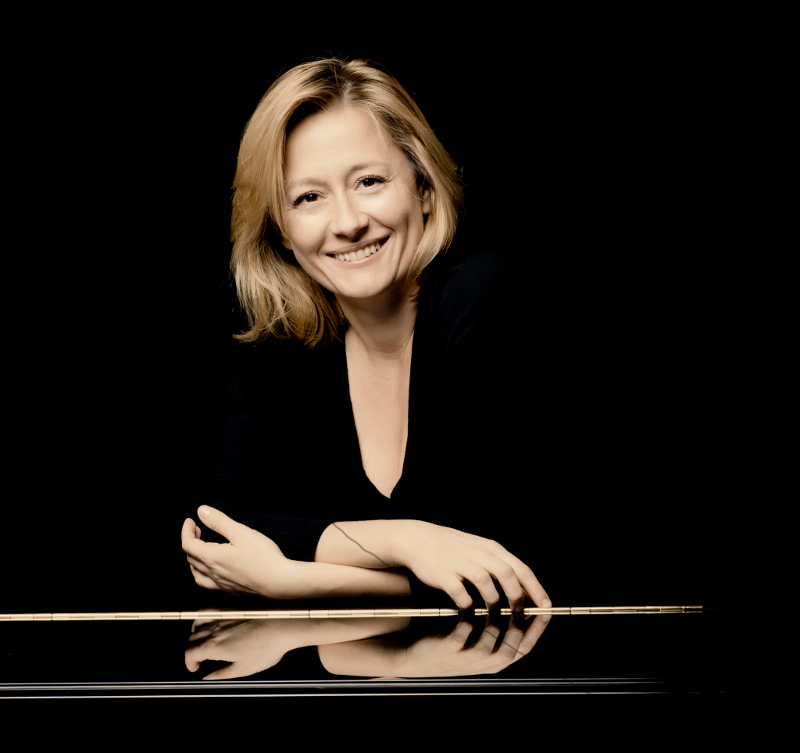Vavic, SCO, Bloch, Queen's Hall, Edinburgh | reviews, news & interviews
Vavic, SCO, Bloch, Queen's Hall, Edinburgh
Vavic, SCO, Bloch, Queen's Hall, Edinburgh
High spirits and tinge of menace in Alexandre Bloch's big-concert SCO debut

It’s not the first time that young French conductor Alexandre Bloch has been in front of the Scottish Chamber Orchestra – he took them on a well-received short Scottish tour last summer. But it was his first main-season gig with the band, and he certainly had something to say. "A bit of French and Russian atmosphere," was how he modestly described his concert in the concert progamme’s intro: it was certainly that, but plenty more besides.
As shown in his opener, Stravinsky’s Dumbarton Oaks, one of the pieces he’d toured with the SCO last summer, and which the players clearly knew inside out. Stravinsky’s wit, rhythmic crispness and neo-classical elegance were almost a given, all present and correct – there was a joyful bounce to Bloch’s direction that drew some immaculately crisp playing from the SCO musicians, particularly the winds on especially splendid form. But there was also a richness and a gentle smoothing of Stravinsky’s hard edges that made Bloch’s account feel especially generous, as if together he and the musicians were delving deep to discover the music behind the notes. He came up with a persuasive solution for playing Stravinsky’s reimagining of Bach in the long-limbed slow movement, too, with forthright, heavily phrased, non-vibrato strings adding a distinctive period touch. Very clever.
 Serbian pianist Anika Vavic (pictured right) was the rather steely soloist in Shostakovich’s Second Piano Concerto, and despite the presence of a very nervous-looking page-turner following her every move, she barely glanced at her score, staring determinedly instead down at her keyboard for a performance that was as fiery and intense as that might suggest. Brittle, too, at times, occasionally hard-edged, especially in an assertive first movement – but enjoyably so, although balance was sometimes an issue with the intimate forces of the SCO. (And you had to wonder how the second violins managed, perched rather precariously on a corner of the Queen’s Hall stage, and apparently only seeing the back of Bloch’s head.) Despite all the high spirits and fizzing humour, though, there was always an edge of menace to Vavic’s vision of the Concerto that never let us forget it utilitarian Soviet origins – even if she gave way nicely to indulgence in a lush slow movement, whose luxurience she matched in the exquisite, restless Scriabin prelude she offered as an encore, seemingly made up on the spot.
Serbian pianist Anika Vavic (pictured right) was the rather steely soloist in Shostakovich’s Second Piano Concerto, and despite the presence of a very nervous-looking page-turner following her every move, she barely glanced at her score, staring determinedly instead down at her keyboard for a performance that was as fiery and intense as that might suggest. Brittle, too, at times, occasionally hard-edged, especially in an assertive first movement – but enjoyably so, although balance was sometimes an issue with the intimate forces of the SCO. (And you had to wonder how the second violins managed, perched rather precariously on a corner of the Queen’s Hall stage, and apparently only seeing the back of Bloch’s head.) Despite all the high spirits and fizzing humour, though, there was always an edge of menace to Vavic’s vision of the Concerto that never let us forget it utilitarian Soviet origins – even if she gave way nicely to indulgence in a lush slow movement, whose luxurience she matched in the exquisite, restless Scriabin prelude she offered as an encore, seemingly made up on the spot.
Strangely, something didn’t gel about the Ravel Pavane pour une infante défunte with which Bloch opened the second half – with not-quite-synced entries, not-quite-balanced textures, it felt hesitant rather than confident at times, and a way away from the first half’s energetic precision. He rounded things off in style, though, with a Bizet Symphony in C so wide-eyed and eager to please that it was impossible not to be entirely beguiled – even if Bloch made sure to inject some grown-up smoothness and sophistication in among all the youthful bustling embullience. Bloch’s passion and precision and the SCO’s instrumental brilliance make a fine partnership, and he’s already been booked to build on what looks like an inspiring relationship in a couple of the SCO concerts next season – a very wise decision.
rating
Explore topics
Share this article
The future of Arts Journalism
You can stop theartsdesk.com closing!
We urgently need financing to survive. Our fundraising drive has thus far raised £49,000 but we need to reach £100,000 or we will be forced to close. Please contribute here: https://gofund.me/c3f6033d
And if you can forward this information to anyone who might assist, we’d be grateful.

Subscribe to theartsdesk.com
Thank you for continuing to read our work on theartsdesk.com. For unlimited access to every article in its entirety, including our archive of more than 15,000 pieces, we're asking for £5 per month or £40 per year. We feel it's a very good deal, and hope you do too.
To take a subscription now simply click here.
And if you're looking for that extra gift for a friend or family member, why not treat them to a theartsdesk.com gift subscription?
more Classical music
 Lammermuir Festival 2025 review - music with soul from the heart of East Lothian
Baroque splendour, and chamber-ensemble drama, amid history-haunted lands
Lammermuir Festival 2025 review - music with soul from the heart of East Lothian
Baroque splendour, and chamber-ensemble drama, amid history-haunted lands
 BBC Proms: Steinbacher, RPO, Petrenko / Sternath, BBCSO, Oramo review - double-bill mixed bag
Young pianist shines in Grieg but Bliss’s portentous cantata disappoints
BBC Proms: Steinbacher, RPO, Petrenko / Sternath, BBCSO, Oramo review - double-bill mixed bag
Young pianist shines in Grieg but Bliss’s portentous cantata disappoints
 theartsdesk at the Lahti Sibelius Festival - early epics by the Finnish master in context
Finnish heroes meet their Austro-German counterparts in breathtaking interpretations
theartsdesk at the Lahti Sibelius Festival - early epics by the Finnish master in context
Finnish heroes meet their Austro-German counterparts in breathtaking interpretations
 Classical CDs: Sleigh rides, pancakes and cigars
Two big boxes, plus new music for brass and a pair of clarinet concertos
Classical CDs: Sleigh rides, pancakes and cigars
Two big boxes, plus new music for brass and a pair of clarinet concertos
 Waley-Cohen, Manchester Camerata, Pether, Whitworth Art Gallery, Manchester review - premiere of no ordinary violin concerto
Images of maternal care inspired by Hepworth and played in a gallery setting
Waley-Cohen, Manchester Camerata, Pether, Whitworth Art Gallery, Manchester review - premiere of no ordinary violin concerto
Images of maternal care inspired by Hepworth and played in a gallery setting
 BBC Proms: Barruk, Norwegian Chamber Orchestra, Kuusisto review - vague incantations, precise laments
First-half mix of Sámi songs and string things falters, but Shostakovich scours the soul
BBC Proms: Barruk, Norwegian Chamber Orchestra, Kuusisto review - vague incantations, precise laments
First-half mix of Sámi songs and string things falters, but Shostakovich scours the soul
 BBC Proms: Alexander’s Feast, Irish Baroque Orchestra, Whelan review - rapturous Handel fills the space
Pure joy, with a touch of introspection, from a great ensemble and three superb soloists
BBC Proms: Alexander’s Feast, Irish Baroque Orchestra, Whelan review - rapturous Handel fills the space
Pure joy, with a touch of introspection, from a great ensemble and three superb soloists
 BBC Proms: Moore, LSO, Bancroft review - the freshness of morning wind and brass
English concert band music...and an outlier
BBC Proms: Moore, LSO, Bancroft review - the freshness of morning wind and brass
English concert band music...and an outlier
 Willis-Sørensen, Ukrainian Freedom Orchestra, Wilson, Cadogan Hall review - romantic resilience
Passion, and polish, from Kyiv's musical warriors
Willis-Sørensen, Ukrainian Freedom Orchestra, Wilson, Cadogan Hall review - romantic resilience
Passion, and polish, from Kyiv's musical warriors
 BBC Proms: Faust, Gewandhausorchester Leipzig, Nelsons review - grace, then grandeur
A great fiddler lightens a dense orchestral palette
BBC Proms: Faust, Gewandhausorchester Leipzig, Nelsons review - grace, then grandeur
A great fiddler lightens a dense orchestral palette
 BBC Proms: Jansen, Royal Concertgebouw Orchestra, Mäkelä review - confirming a phenomenon
Second Prom of a great orchestra and chief conductor in waiting never puts a foot wrong
BBC Proms: Jansen, Royal Concertgebouw Orchestra, Mäkelä review - confirming a phenomenon
Second Prom of a great orchestra and chief conductor in waiting never puts a foot wrong
 BBC Proms: Royal Concertgebouw Orchestra, Mäkelä review - defiantly introverted Mahler 5 gives food for thought
Chief Conductor in Waiting has supple, nuanced chemistry with a great orchestra
BBC Proms: Royal Concertgebouw Orchestra, Mäkelä review - defiantly introverted Mahler 5 gives food for thought
Chief Conductor in Waiting has supple, nuanced chemistry with a great orchestra

Add comment